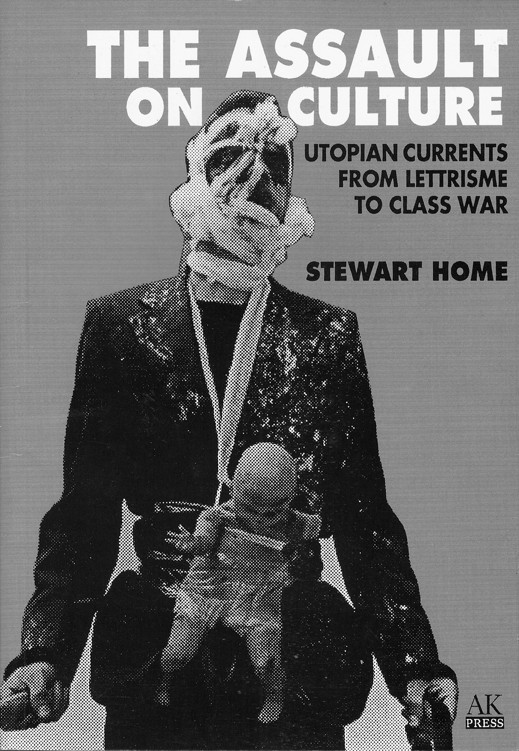Richard Barbrook: Class Wargames: Ludic Subversion Against Spectacular Capitalism (2014)
Filed under book | Tags: · activism, avant-garde, capitalism, constructivism, game, military, neoliberalism, new left, participation, politics, psychogeography, situationists, war

“Why should radicals be interested in playing wargames? Surely the Left can have no interest in such militarist fantasies? Yet, Guy Debord – the leader of the Situationist International – placed such importance on his invention of The Game of War that he described it as the most significant of his accomplishments.
Intrigued by this claim, a multinational group of artists, activists and academics formed Class Wargames to investigate the political and strategic lessons that could be learnt from playing his ludic experiment. While the ideas of the Situationists continue to be highly influential in the development of subversive art and politics, relatively little attention has been paid to their strategic orientation. Determined to correct this deficiency, Class Wargames is committed to exploring how Debord used the metaphor of the Napoleonic battlefield to propagate a Situationist analysis of modern culture and politics. Inspired by his example its members have also hacked other military simulations: H.G. Wells’ Little Wars; Chris Peers’ Reds versus Reds and Richard Borg’s Commands & Colors. Playing wargames is not a diversion from politics: it is the training ground of tomorrow’s communist insurgents.
Fusing together historical research on avant-garde artists, political revolutionaries and military theorists with narratives of five years of public performances, Class Wargames provides a strategic and tactical manual for subverting the economic, political and ideological hierarchies of early-21st century neoliberal capitalism. The knowledge required to create a truly human civilisation is there to be discovered on the game board!” (from the back cover)
Publisher Minor Compositions, an imprint of Autonomedia, 2014
Creative Commons BY-NC 3.0 Licence
ISBN 9781570272936
444 pages
via Marcell
PDF (8 MB)
Scribd
See also Guy Debord’s ‘The Game of War’ – The Film (26 min, c2011)
Martin Puchner: Poetry of the Revolution: Marx, Manifestos, and the Avant-Gardes (2005)
Filed under book | Tags: · aesthetics, art, art history, avant-garde, communism, dada, futurism, literature, marxism, politics, revolution, situationists, surrealism, theatre

“Poetry of the Revolution tells the story of political and artistic upheavals through the manifestos of the nineteenth and twentieth centuries. Ranging from the Communist Manifesto to the manifestos of the 1960s and beyond, it highlights the varied alliances and rivalries between socialism and repeated waves of avant-garde art. Martin Puchner argues that the manifesto–what Marx called the ‘poetry’ of the revolution–was the genre through which modern culture articulated its revolutionary ambitions and desires. When it intruded into the sphere of art, the manifesto created an art in its own image: shrill and aggressive, political and polemical. The result was “manifesto art”–combinations of manifesto and art that fundamentally transformed the artistic landscape of the twentieth century.
Central to modern politics and art, the manifesto also measures the geography of modernity. The translations, editions, and adaptations of such texts as the Communist Manifesto and the Futurist Manifesto registered and advanced the spread of revolutionary modernity and of avant-garde movements across Europe and to the Americas. The rapid diffusion of these manifestos was made “possible by networks–such as the successive socialist internationals and international avant-garde movements–that connected Santiago and Zurich, Moscow and New York, London and Mexico City. Poetry of the Revolution thus provides the point of departure for a truly global analysis of modernism and modernity.”
Publisher Princeton University Press, 2005
Translation/Transnation series
ISBN 1400844126, 9781400844128
336 pages
via delery
Reviews: Gregory Byala (Bryn Mawr Review of Comparative Literature), Randy Martin (The Drama Review), Matthew Rebhorn (Modern Drama), Laura A. Winkiel (Modernism/Modernity), Gavin Grindon (Papers of Surrealism).
PDF (16 MB, updated on 2017-6-18)
See also the entry on Marxist aesthetics on Monoskop wiki.
Comment (0)Stewart Home: The Assault on Culture: Utopian Currents from Lettrisme to Class War (1988–) [EN, IT, ES]
Filed under book | Tags: · aesthetics, art, art history, avant-garde, fluxus, lettrism, mail art, neoism, pataphysics, punk, situationists

In The Assault on Culture, Stewart Home outlines the subterranean history of mid-to-late 20th century avant-gardes in which artistic and political vanguardism emerge as indissociable. In a comprehensive overview of relatively marginal movements—such as lettrism, situationism, and punk—Home analyzes these radical practices and experiences, which, due to their involvement in alternative forms of sociability as well as their relational, process-oriented, and political character, have remained at the margins of dominant art historiography. Home thereby establishes a critical rewriting of the neo avant-garde from a perspective that shares little with the paradigm of modernist formalism. (from MACBA)
First published by Aporia Press and Unpopular Books, London, 1988
Second UK edition, by AK Press, 1991
Review: Libero Andreotti (J Architectural Education, 1996).
Commentary: Not Bored! (1996, Home’s response)
The Assault on Culture (PDF), EPUB, HTML (from the author)
Assalto alla cultura (Italian, trans. Luther Blissett, 1996, unpaginated)
El asalto a la cultura (Spanish, trans. Jesus Carrillo and Jordi Claramonte, 2002)
See also Home’s Neoism, Plagiarism & Praxis, 1995.
Comment (0)
